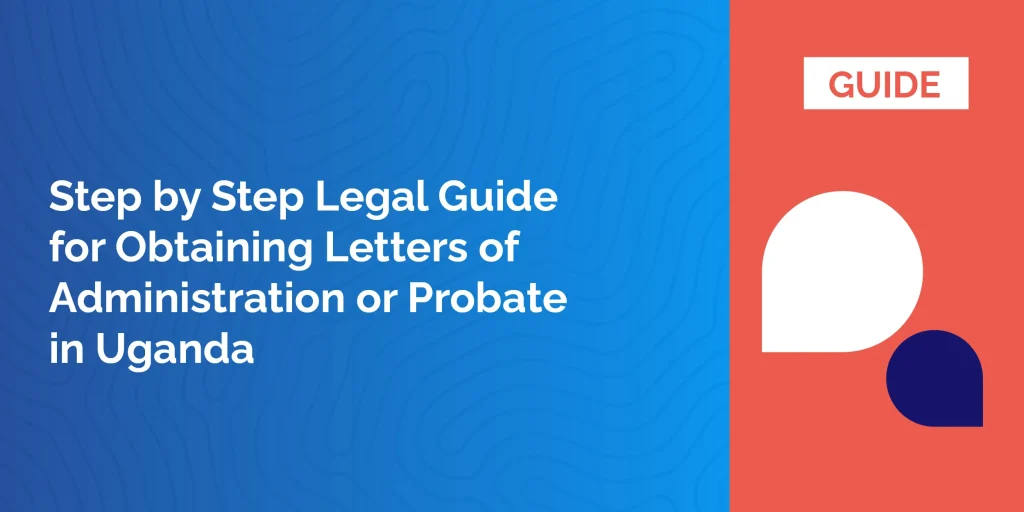Introduction
Pursuant to the Administrator General’s Act Cap 157, every death that occurs must be reported to the administrator general and this report must give details as far as possible of the property that the deceased left behind. The law thus appears to vest all deceased’s property in Government into the Administrator General and this is the reason why other than the surviving spouse, everyone else must obtain a certificate of no objection from the administrator general before applying for letters of administration.
The law in Uganda makes it a criminal offence for anyone to deal with the estate of the deceased person without proper authorization such as grant of letters of administration or Probate whichever is applicable.
In this article, we shall take stock of the details surrounding processes for obtaining letters of administration or probate, practical approaches to deal with the hitherto stressful process, the post grant compliance requirements and offences associated with non-compliance with the law while dealing with the estate or before obtaining the grant.
When does one apply for letters of administration
The law imposes a duty upon the surviving relatives of the deceased to apply for letters of administration if the deceased died intestate. Dying intestate connotes dying without leaving behind a valid will in which case the relatives will move court for a grant that will determine an individual or group of individuals who will manage the distribution of the estate. Suffice to note that persons entitled to apply for letters are only those related to the deceased my marriage or Consanguinity.
When does one apply for letters of Probate
In a situation where the deceased left a valid will that validly names an executor of the estate, the said executor is required to petition court for letters of probate. The court in this case has the duty to confirm the validity of the will as well as identify the executor and the beneficiaries before granting letters of probate.
The detailed process for obtaining letters of administration
- Obtain Death certificate from NIRA
A death is reported by way of filing a death certificate at the administrator General. The family members to the deceased member have a duty to process the death certificate which follows a very defined simple process under the National Identification and Registration Authority. Briefly, if death occurs in the medical facility, the administrator of the facility records the death and notifies the registration officer who issues a death certificate upon payment of the prescribed fee. If death occurs in the community, the chief/town clerk records the death and notifies the registration officer who will issue a certificate upon payment of the prescribed fee.
A death certificate is free to a refugee who dies in Uganda upon presentation of the proof of refugee status by the family member or concerned individual.
- Application for Certificate of No objection (CONO) from Administrator General
The family members of the deceased who dies intestate are required to report the death to the administrator general using a prescribed form obtained from the administrator general’s office. Before proceeding to the administrator general however, it is important for the family to agree on which member or members to lead this process. It is these members who will appear at the administrator general’s office and open a file. The said file will be allocated to an assistant administrator general who will conduct a fact-finding interview with the family to determine issues relating to property, children, spouses if any and whether the deceased left a will.
Arising from this interview, the officer will determine the geographical jurisdiction of the properties left behind and will write a formal letter directing the Chief Administrative officer (CAO) of the district where the deceased left property to conduct a family meeting. The purpose of this family meeting is to enable the family to select a person to be given a certificate of no objection and to obtain facts listed in the letter requisitioning the said meeting.
The CAO will convene the family meeting and prepare detailed minutes of the meeting for onward submission to administrator general who will upon perusal of the same grant a certificate of no objection to the person agreed upon by the family. The beneficiaries will sign a consent to confirm to the administrator general that they are not opposed to the selected individual. Most specifically, the CAO must ascertain and document the following facts:
- Whether the deceased left a widow or widower.
- Whether the deceased left a will.
- Whether the deceased left dependants.
- Whether the deceased left children and of what ages they are.
- Whether the deceased bequeathed some properties prior to his or her death.
- The names and contact details of the individual who has been selected by the family to obtain a Certificate of No Objection.
- In which Court should one file for letters of administration
Petitions for letters of administration abide the pecuniary jurisdiction requirements under the Civil and criminal procedure rules of Uganda. As such, if the value of the estate is Ugx 50,000,000/= or more, the application shall be filed at the High court in the applicable high court Division. If the value of the estate is between Ugx 20,000,000/= and 50,000,000/= the petition is filed at the Chief Magistrates Court. If the Value of the estate is Ugx 20,000,000/= or less the petition is filed at the Magistrate Grade one Court.
- Petition for letters of administration
At this stage, the intending administrator is ready to file the petition for letters of administration. The Petition will be accompanied by the death certificate, certificate of No Objection from administrator general, minutes of the family meeting, the consents of the beneficiaries, a draft administration bond and a notice of application for letters. The said notice is signed by the deputy registrar and published in the news papers giving notice to whoever objects to the grant to come up and caveat the grant within 14 days. If no one comes up after the said period, the court will fix the Petition for identification of the proposed administrator/s and grant of letters will be done upon signing of the administration bond by the petitioner/s.
It is important for the petitioner to state the estimated value of the property left by the deceased to enable the court confirm that it is possessed with the pecuniary jurisdiction to deal with the petition.
Key Compliance requirements under the amended succession Act
The amended succession law introduced specific timelines within which every holder of letters of administration or probate must align to. We summarise them below: –
- Letters of administration/probate granted to private persons before 31st May 2022 were made to expire on 31st May 2025.
- Letters of administration/probate granted after 31st May 2022 shall expire after two years from the date of the grant.
- Letters of administration/probate granted to the administrator general before 31st May 2022 shall expire on 31st May 2027.
The amended law has capped the period within which the administrator must exercise the power under the grant with the option that should the time allowed under the law lapse before concluding the estate, an application can be filed before the Court that issued the grant for extension in line with the civil procedure rules applicable.
Importantly, the administrator must ensure filing of an inventory and final account within the time allowed under the law. If the administrator fails to file the inventory and final account within time, he/she can apply to court to extend time within which to file the said documents.
Offences that may be committed by unlawful dealing with the deceased’s estate
The law has in attempting to ensure more justice and alignment of the succession laws with the Constitution has made it risky for anyone to deal with the estate in a manner not contemplated under the law. The law introduces the following offences: –
- Mismanagement and misapplication- Any person who misapplies the estate of the deceased person before the grant of probate or letters of administration causing loss commits an offence.
- Unlawful eviction- Anyone who unlawfully evicts a surviving spouse, lineal descendant or dependent relative from the residential holding or any other residential property they are entitled to occupy commits an offence.
- Disposal of estate property without consent- Any person who disposes estate property without the consent of surviving spouse and lineal descendants commits an offence.
Concluding remarks
The law, more than ever before has streamlined the entire estate management process. To take benefit from this process however, it is crucial to ensure the following: –
- Ensure organisation of your estate by way of writing a valid will before your passing. A will makes your wishes well known and court will always ensure that the said wishes are fulfilled. (Look out for our article on the making of a valid will in Uganda on www.ditadvocates.com or www.ugandalawyers.co.ug).
- Ensure that if you are selected to administer the estate, you do so with fairness and in accordance with the law and within timelines allowed under the law.
- Ensure that as administrator, you apply and seek guidance of Court should anything not be clear or is likely to cause differences with beneficiaries.





